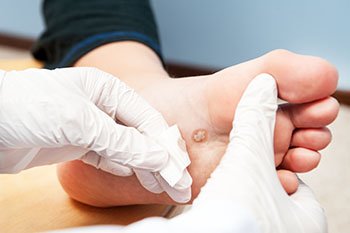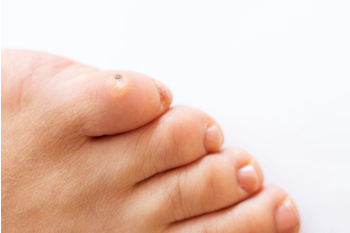
Plantar warts are growths that appear on the soles of the feet, caused by the human papillomavirus, or HPV. They often develop in areas of pressure, like the heel or ball of the foot, and can sometimes combine to form a condition known as mosaic warts. Mosaic warts are clusters of multiple warts that spread out across a larger area, creating a patchy, rough surface. These warts can cause pain, especially when walking or standing for long periods. They often look like small, rough bumps with black dots in the center, which are blood vessels. The area susrrounding the wart may become hardened and calloused. A podiatrist can diagnose and treat plantar warts through various methods, including cryotherapy or freezing, laser treatment, and minor surgery. They may also provide topical treatments and advice on preventing the spread of the virus. If you have this condition, it is suggested that you schedule an appointment with a podiatrist for appropriate care.
Plantar warts can be very uncomfortable. If you need your feet checked, contact one of our podiatrists from Westland Foot & Ankle Specialists, P.C.. Our doctors will assist you with all of your foot and ankle needs.
About Plantar Warts
Plantar warts are the result of HPV, or human papillomavirus, getting into open wounds on the feet. They are mostly found on the heels or balls of the feet.
While plantar warts are generally harmless, those experiencing excessive pain or those suffering from diabetes or a compromised immune system require immediate medical care. Plantar warts are easily diagnosed, usually through scraping off a bit of rough skin or by getting a biopsy.
Symptoms
- Lesions on the bottom of your feet, usually rough and grainy
- Hard or thick callused spots
- Wart seeds, which are small clotted blood vessels that look like little black spots
- Pain, discomfort, or tenderness of your feet when walking or standing
Treatment
- Freezing
- Electric tool removal
- Laser Treatment
- Topical Creams (prescription only)
- Over-the-counter medications
To help prevent developing plantar warts, avoid walking barefoot over abrasive surfaces that can cause cuts or wounds for HPV to get into. Avoiding direct contact with other warts, as well as not picking or rubbing existing warts, can help prevent the further spread of plantar warts. However, if you think you have developed plantar warts, speak to your podiatrist. He or she can diagnose the warts on your feet and recommend the appropriate treatment options.
If you have any questions please feel free to contact our office located in Westland, MI. . We offer the newest diagnostic and treatment technologies for all your foot and ankle needs.

Seed corns are small, hardened areas of skin that develop on the feet due to repeated friction and pressure. They appear as tiny, round calluses with a central core and often form on weight-bearing areas. These corns commonly develop on the ball of the foot, the bottom of the heel, or the sides of the toes. Causes include wearing tight or ill-fitting shoes, excessive walking or running, and dry skin that lacks natural protection. Unlike larger corns, seed corns can be tender and may cause discomfort when pressure is applied. Keeping the feet moisturized, wearing well-fitted shoes, and using protective padding can help prevent their formation. Seed corns can be painful, and may cause difficulty in completing daily activities. If you have corns on your feet, it is suggested that you visit a podiatrist who can offer effective relief and treatment solutions.
If you have any concerns regarding your feet and ankles, contact one of our podiatrists of Westland Foot & Ankle Specialists, P.C.. Our doctors will treat your foot and ankle needs.
Corns: What Are They? and How Do You Get Rid of Them?
Corns can be described as areas of the skin that have thickened to the point of becoming painful or irritating. They are often layers and layers of the skin that have become dry and rough, and are normally smaller than calluses.
Ways to Prevent Corns
There are many ways to get rid of painful corns such as wearing:
- Well-fitting socks
- Comfortable shoes that are not tight around your foot
- Shoes that offer support
Treating Corns
Treatment of corns involves removing the dead skin that has built up in the specific area of the foot. Consult with Our doctors to determine the best treatment option for your case of corns.
If you have any questions please feel free to contact our office located in Westland, MI. . We offer the newest diagnostic and treatment technologies for all your foot and ankle needs.

Gangrene is a serious condition that occurs when tissue dies due to a lack of blood flow or an infection. People with diabetes are at a higher risk of developing gangrene, particularly in the feet, toes, and ankles, as a result of poor circulation and a reduced ability to heal wounds. High blood sugar can damage nerves, leading to loss of sensation, which makes it difficult to detect injuries. Small cuts, blisters, or ulcers may go unnoticed, increasing the chance of infection. If an infection worsens, tissue death can occur, and surgery may be required to remove the affected area. Signs of gangrene include skin discoloration, swelling, foul-smelling discharge, and numbness. If left untreated, the infection can spread and lead to severe complications. A podiatrist can help by identifying foot problems early, treating wounds before they worsen, and recommending strategies to improve circulation. Regular foot exams are essential for preventing complications like gangrene. If you have diabetes and suffer from foot ulcers, it is suggested that you schedule regular appointments with a podiatrist for checkups and appropriate care.
Diabetic foot care is important in preventing foot ailments such as ulcers. If you are suffering from diabetes or have any other concerns about your feet, contact one of our podiatrists from Westland Foot & Ankle Specialists, P.C.. Our doctors can provide the care you need to keep you pain-free and on your feet.
Diabetic Foot Care
Diabetes affects millions of people every year. The condition can damage blood vessels in many parts of the body, especially the feet. Because of this, taking care of your feet is essential if you have diabetes, and having a podiatrist help monitor your foot health is highly recommended.
The Importance of Caring for Your Feet
- Routinely inspect your feet for bruises or sores.
- Wear socks that fit your feet comfortably.
- Wear comfortable shoes that provide adequate support.
Patients with diabetes should have their doctor monitor their blood levels, as blood sugar levels play such a huge role in diabetic care. Monitoring these levels on a regular basis is highly advised.
It is always best to inform your healthcare professional of any concerns you may have regarding your feet, especially for diabetic patients. Early treatment and routine foot examinations are keys to maintaining proper health, especially because severe complications can arise if proper treatment is not applied.
If you have any questions please feel free to contact our office located in Westland, MI. . We offer the newest diagnostic and treatment technologies for all your foot and ankle needs.

